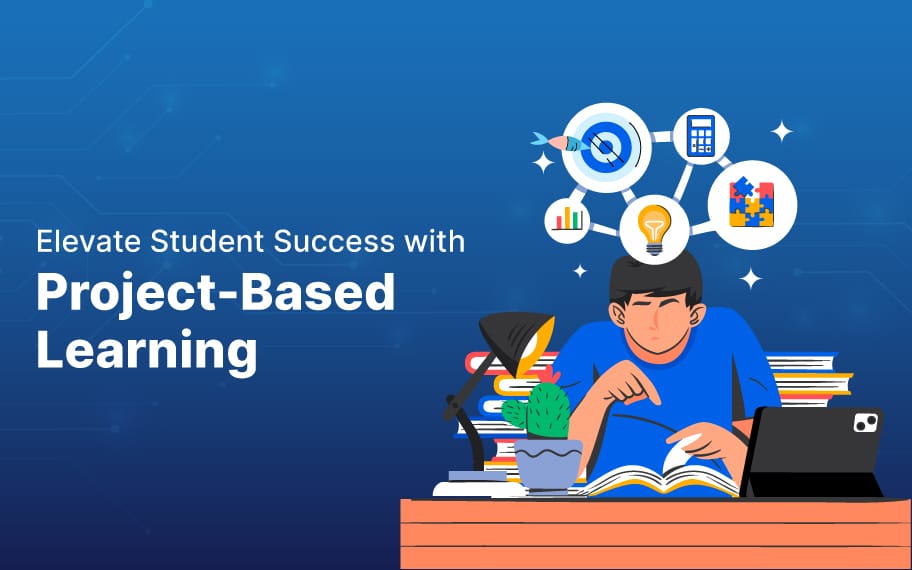School education has always had a simple approach. The teacher gave lectures in the class that students memorize in reference to textbooks and notes, then appear for assessments and examinations during the academic year. Over the years, there have been changes and newer findings in teaching methodology that teachers and students have embraced for progress. Adding to this series is project-based learning, which gives promising student learning outcomes.
This learner-first approach enables increased student retention and enhances the way students think and act on real-world projects. PBL is becoming increasingly popular in schools and various educational settings, with a number of approaches implemented.
What is Project-Based Learning?
Project-Based Learning (PBL) is an educational approach that teaches students skills and concepts. PBL is a student-centered teaching technique that emphasizes problem-solving, analytical thinking, teamwork, and communication skills.
PBL requires students to conceive, evolve, and build hands-on solutions to problems. The educational advantage of this result-oriented learning is that it develops students' creative potential to work through challenging situations.
PBL is more than a teaching approach; it is an engaging, hands-on, personalized learning approach that sparks curiosity, promotes innovative thinking, offers everyday and professional skills, and prepares students for real-world challenges.
Isn’t Project-Based Learning just “Doing a Project”?
Simply put, project-based learning sounds similar to doing a project if we go by their names and certain activities involved. However, there are several important differences between "doing a project" and participating in thorough project-based learning.
Let’s dive deeper with an example:
A simple way to understand how project-based learning is different from “doing a project” is that “doing a project” is a “dessert project," whereas project-based learning is a “main course project”.
A "dessert project" is a brief, light-hearted project that is given once the teacher has covered a unit's subject in the standard way. On the other hand, a "main course" project is one where the project is the lesson.
In project-based learning, the project serves as the medium through which students are provided with the essential skills and abilities they must learn. The project includes curriculum and instruction and surrounds it.
In comparison with dessert projects, PBL involves analytical thinking, problem-solving, cooperation, and various kinds of communication. Students must do far more than simply memorize the topics to be able to create top-notch work and respond to a targeted query. They must learn how to collaborate with others and apply their conceptual thinking skills.
Benefits of Project-Based Learning
Because of its emphasis on innovative thinking and teamwork, PBL is enhanced when students have the opportunity to collaborate across subject areas, use technology to improve communication, and create products or solutions to real-world challenges posed by companies or businesses.
Here are some striking benefits of project-based learning:
Collaborative Skills
Students learn how to function in groups, which fosters a number of the interpersonal principles and skills they require. Additionally, they also learn how to listen intently, provide their own ideas, and solve challenges when they come up. Students develop gratitude for the efforts and work done by others and learn to divide up tasks.
Problem-Solving Skills
The process of creating and providing a project-generated result naturally develops problem-solving skills. It includes having the knack to begin again over and learn from mistakes when tackling significant challenges that affect people or the community as a whole. When students have to complete a real-world situation-based project, they are challenged to find the most effective solution achievable.
Better Understanding of Topics
Students understand topics more effectively when they know how to apply their understanding and are required to perform additional research on the subject. PBL gives students a more thorough and insightful comprehension of the topic at hand.
Students are able to remember the topics more efficiently and for longer when they apply the concepts they have learned to real-world problems. When students work on a topic repeatedly and integrate their knowledge, memory recall improves in comparison to reading basic content from books.
Prepared for Higher Studies and Career
PBL equips students with the essential analytical thinking, problem-solving, and interpersonal competencies necessary for being successful, preparing them for the demands of higher education and beyond. Additionally, this kind of result-oriented learning fosters a lifelong passion for learning and an eagerness to keep discovering new things.
Wrapping Up!
In today's rapidly evolving and cutting-edge technological setting, learning through hands-on experience is the most effective approach. Project-based learning takes the fundamental components of what we appreciate most about learning and places them at the core of the formal educational setting. It is a widespread and laudable goal for teachers to encourage and nurture students for different stages of education and professional endeavors in life.
As the entire world is practicing this approach to learning, students exposed to this method of learning can easily blend into any institution or further get a position in any leading organization. When a student is equipped with ways to tackle any problem with their learning, they open up various opportunities for themselves.
PBL is more than just a learning method; it is also a means of collaboration. If students begin to take initiative in what they learn, it will act as the foundation for how they will collaborate with different people growing up!
Learn more about Teachmint plans here.






